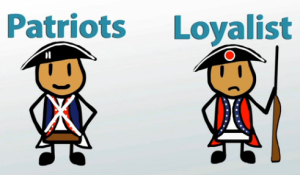 Kacy Tillman, Stripped and Script: Loyalist Women Writers of the American Revolution (Amherst: University of Massachusetts Press, 2019).
Kacy Tillman, Stripped and Script: Loyalist Women Writers of the American Revolution (Amherst: University of Massachusetts Press, 2019).
Studies of loyalist women were at the forefront of studies of women in early America and the American Revolution. Scholars including Mary Beth Norton, Janice Potter-MacKinnon, Linda Kerber have examined how women, supporters, neutrals, and opponents alike, experienced and participated in the American Revolution. Contributing to this vibrant area of scholarship, Kacy Tillman’s Stripped and Script: Loyalist Women Writers of the American Revolution focuses on loyalist women as writers. While much scholarship on the American Revolution and loyalism examines the rhetoric and war writing in essays, broadsides, and pamphlets typically published by men, Stripped and Script focuses on how women writers used “public, if not published” letters and journals to engage in politics and to craft their own senses of loyalties.[1] Continue reading




 On April 25, 1775, hundreds of New Yorkers acknowledged receiving “a Good firelock, Bayonet, Cartouch Box, and Belt.” Six days after the Battles of Lexington and Concord, and three days after Israel (Isaac) Bissell told New Yorkers the news, Alexander McDougall mobilized support against the British. The War of American Independence had reached New York and, with hundreds of supporters, McDougall was ready to fight.
On April 25, 1775, hundreds of New Yorkers acknowledged receiving “a Good firelock, Bayonet, Cartouch Box, and Belt.” Six days after the Battles of Lexington and Concord, and three days after Israel (Isaac) Bissell told New Yorkers the news, Alexander McDougall mobilized support against the British. The War of American Independence had reached New York and, with hundreds of supporters, McDougall was ready to fight. I like eye-catching book titles. Who doesn’t, right? A good title should run of the tongue without too much fuss, while also championing the main argument(s) of the book. Recent books with titles that caught my eye include Benjamin Irvin’s Clothed in Robes of Sovereignty, Jessica Roney’s Governed by a Spirit of Opposition, and Albrecht Koschnik’s “Let a Common Interest Bind Us Together.” To be sure, there are others, and they are held together by a common thread: Despite looking at different periods with different objectives, each title offers a snapshot of what the reader can expect to find.
I like eye-catching book titles. Who doesn’t, right? A good title should run of the tongue without too much fuss, while also championing the main argument(s) of the book. Recent books with titles that caught my eye include Benjamin Irvin’s Clothed in Robes of Sovereignty, Jessica Roney’s Governed by a Spirit of Opposition, and Albrecht Koschnik’s “Let a Common Interest Bind Us Together.” To be sure, there are others, and they are held together by a common thread: Despite looking at different periods with different objectives, each title offers a snapshot of what the reader can expect to find.  The AMC series Turn ended its first season last month with mixed reviews. The consensus seems to be that the series, which tells the story of the Culper spy ring during the American Revolution, has a strong cast, good production values, and promising subject matter but ultimately fails both as a drama and as an accurate representation of history.
The AMC series Turn ended its first season last month with mixed reviews. The consensus seems to be that the series, which tells the story of the Culper spy ring during the American Revolution, has a strong cast, good production values, and promising subject matter but ultimately fails both as a drama and as an accurate representation of history. 